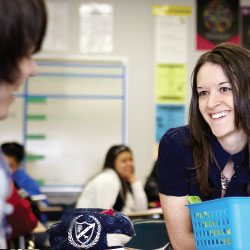Bright Ideas: Connect the Classroom With District Progress
In a classroom in Federal Way High School, SPU doctoral student Lindsay O'Neal posts a thoughtful new quote every day. It's just one of her strategies for inspiring students to prepare themselves for the world beyond graduation.
“I don't want to just send them out the door, wave goodbye, and that's it,” she says. “I want to give them enough tools that they'll be successful later on.”
She knows something about the territory. She walked these same hallways as a student only 12 years ago.
But she faces some challenges that reflect a changing student body. “Back then,” she says, “if you wanted a pass for the senior parking lot, you had to be on a wait list; it was full of very nice cars. Now there are a lot of empty places. Students can't afford vehicles.”

![]() View more photos
View more photos
Lisa Griebel, Federal Way's principal, says math teacher Lindsay O'Neal (right) “challenges students to continue to do better, and then provides them the structure and foundation to improve.”
To help financially challenged students get into college and succeed, Federal Way High School has implemented systemwide programs. It is one of only 100 demonstration schools employing a research-proven program called Advancement Via Individual Determination, which narrows the achievement gap by training students in effective college-student practices: critical thinking, note-taking, asking questions, and reading textbooks.
Teachers can mistakenly assume that others will train students in these skills, says O'Neal. “We've been very intentional about saying, ‘No, we need to teach them.'”
Federal Way is also the first West Coast high school to embrace the Cambridge International Examinations program, a rigorous ninth through 12th grade curriculum that covers all subject areas. Other advantageous programs include the Academic Success Academy, which helps seniors who are "off track" graduate on time, and the AIM Academy, which helps ninth graders whose skills are not at grade-level.
These efforts are working. “A lot of our students will be the first in their family to go to college,” says O'Neal.
Federal Way's success also comes from their safe, supportive learning environment. Teachers provide an influential presence in the hallways between classes. For O'Neal, that means paying attention to “the little things.” “I stand at the door, and I greet my students as they walk in,” she says. “I try to teach them things like saying ‘please' and ‘thank you.'”
Even though O'Neal now follows in her teachers' footsteps, she still wears the shoes of a student. “I'm always pushing my students to think about their goals and dreams. So I decided I needed to follow my own advice — and go back to school.” And she did. After earning her master's degree and teaching certification at the University of Puget Sound, O'Neal is in her first year of earning a
Ph.D. in education at Seattle Pacific.
Create 180-Degree Change With Tiny Steps
Harness Technology That Gives Kids a Voice
Advocate for Students in and out of School
